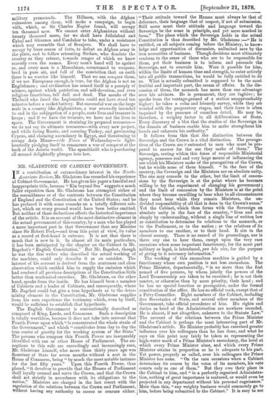WILL SHERE ALI FIGHT, OR YIELD ?
THAT is a question which greatly interests English Taxpayers, for the answer may make the difference to them of 3d. in the Income-tax for five years at least. The Ministry have de- cided, we believe, without the smallest consultation with the country, that they will invite Shere Ali, the Ameer of Afghanistan, to enter into a strictly subordinate alliance with the Indian Government, and to guard his whole territory against Russia on behalf of British interests. If he accepts the invitation, nothing further will be done beyond signing another Treaty, and appointing Residents to carry it out ; but if he refuses, Afghanistan will be invaded from two sides, Shere All will be deposed, and his dominions will be added to the Indian Empire. Another Chief Commis- sionership will be formed, the Hindoo Koosh will become the boundary of India, and ten thousand Europeans will be can- toned in the new province. As Afghans can fight, and as the Passes must be securely held, the invasion will require an army of 20,000 men, with 15,000 in reserve—some demi-official authorities double these figures—and will therefore involve a war of the second, if not of the first class, a war with indefinite possibilities, as the Russians may stir, or the Persians may come to the assistance of the third Mussulman Prince. The Ministry, however, believe that the expense of this operation may be avoided, for Shere Ali, once confronted with Sir Neville -Chamberlain, is sure, they think, to yield all the demands he will be ordered to present. The Indian Government, they argue, can offer Shere All very great advantages. They can guarantee his possessions and his dynasty, through any son whom he 'may please in open Durbar to select. That will be a grand protection to him against his Sirdars and against his son Yakoob, whom he both hates and fears ; and against the Russians, who otherwise might treat him as they have treated the Khans of Central Asia, heirs some of them of monarchies older than his own. The lineal heir of Jenghiz, for example, lives, as Shere Ali knows, in the Russian Court. Protection against such masters will be invaluable to him, as will also rifles, English officers for his army, and perhaps a moderate subsidy. He may even acquire new provinces, for the northern districts are hardly his, and Herat is always -revolting or submitting to an insurgent Sirdar. The shadow of the Empire will fall chilly on all turbulent soldiers, and Shere Ali dependent, but safe, will hear reason, and give way. He gives up little but independence, for his sovereign right of oppression within his own dominions will be most strictly preserved. On the other hand, he will be convinced that if he does not yield, the Army of India will march, and he and his dynasty will be swept away. It never was as strong, as he knows, as that of Runjeet Singh, who could put sixty thousand men into the field, and that disappeared in three months,—with 2,000 Afghans, too, fighting in its ranks. 'Shere Ali, of all men, will feel that British power is irre- sistible, and that his alternatives are submission or extinction.
If these are their views, we are unable to agree with her Majesty's Ministers. Apart altogether from a very strong belief that the proposed extension of frontier is unwise, and -without advancing the argument that the war will be hope- lessly immoral, as immoral as a German war against France because France may one day grow strong, we doubt whether Shere Ali will see the Ministerial arguments in the light in -which their supporters at home affect to see them. The man himself is a most exceptional being, able, determined, and energetic, with a history of blood and success behind him, master in his own dominions, and proud to excess alike of his great father and himself ; but there is a streak in his character of insane gloom, such as the sacred chronicler ascribes to Saul. It is not hypochondriac gloom, however, but the gloom of a man who can wake out of it to a burst of furious, bloodthirsty energy, such as his Sirdars and his children have acutely learned to dread. He is much more likely, therefore, to reason something in this wise :—" I was right, then, and these English did mean mischief, though they swore they did not, when they occupied Quetta, the garden-gate of my house. They want my kingdom, to get soldiers from. They took Runjeet's inheritance, and made an army of his people, and so were saved when the Sepoys rose, and now they want my people, too. Yes, that is the reason, for they are rich, and do not want my lands, but they are so worn out that they are sending Sepoys home to guard their Queen. Protect me ? Why should they care for me enough for that Guarantee me ? I am Shere Ali, whose enemies are all dead What is the worth of their guarantee ? They guaranteed Shah Soojah, and he died in exile ; and they kept the Kohinoor, that Runjeet stole from their poor protigt:. They will secure my succession ? Yes, that some daughter-in-law may drug my coffee. Those Russians will never come here, and if they do, I can make myself the Lord Sahib's vassal then. They are not at the foot of the Hindoo Koosh yet, nor have they got Herat, while the English have got my patrimony, Peshawur. Money, for me ? I have not got the seven crores I talked about in Durbar, thinking that my Sirdars would accept seven as the lucky number ; but I have a treasure, and can do without their silver. These English are slinking in, as usual, to govern me, and make me like those wretched Hindoo Princes, and intrigue with my followers, and then grind me slowly to powder. They are the craftiest of all men, as well as the strongest. And I, Shere Ali, the Afghan, to whom the Khalif writes, am to be pro- claimed all over Asia, in Teheran, and Stamboul, and Delhi, a faithless Mussulman, a vassal of the Giaour, who has surren- dered the independence of the last Mahommedan free State in this region. I will tight sooner, and have at least the luxury of slaying. But then, can I fight ? Those moun- tain men will defend the Passes, if I call on them in the name of Islam; and I have forty thousand good men, before whom the Sepoyk would be chaff. Why, we conquered Delhi! There are the White gunners, to be sure, who are terrible ; but they were here before, and they went back again. Would they have gone back, if they could have stayed ? My father was these men's prisoner, and played chess with the Lord Sahib's sister, yet he died an independent king. Shall I refuse to see Chamberlain? No; God is great, and time brings all things, and I will hear what he says, and watch him ; and then—then, if they are asking such things as I hear, I will fight ; I can but make peace at last, and who knows what Allah may do for Islam ? Those children of Timour had lived South too long, and were half Hindoos. I shall not be beaten so easily."
These, we say, are thoughts at least as likely to arise in the fierce chief's mind, and they are not the most dangerous thoughts of all. They contain reasons of a kind, and he may act without reason. Beneath all the cunning and duplicity and submissiveness of the Asiatic, there is a trace of very lofty chivalry, of ultimate persuasion that if the need arises, it is a duty to die without counting heads. Nothing is more remarkable in the whole Native history of India than the utter recklessness with which an astute, long-headed insurgent would sometimes pit, himself against irresistible force. A mere chief would suddenly defy Aurungzebe, just as a mere landowner would defy the King of Oude, or as a Jaghiredar, about as important as Lord Derby, will to this hour hurl himself against a Sovereign protected by the British Empire. It is our fashion to ascribe such foolhardiness to ignorance, but the chiefs know the odds quite well, and fight because in their own judgment fighting is indispensable. In 1838, just when the Mutiny died away, the garrison of Chittagong, at the extremity of the Bengal Presidency, isolated, without artillery and without a hope, revolted, and marched 700 miles through an utterly hostile country, until they met their doom. " It was upon them," they said, to revolt, and they revolted. An overmastering impulse of this kind may seize Shere Ali, will seize him if his pride or his religious honour is touched, and then arguments will be as much thrown away as promises, and we shall have a valueless Bosnia to subdue, with a loftier Alps behind our invading armies.
We do not say that we cannot do it. With a conscription, England could conquer Asia ; and we do not forget how the " Army of Vengeance "marched through the revolted kingdom, leaving behind it, we fear, memories which will not smooth our advance in December next. India is strong enough to sub- jugate Afghanistan,—of that there is no doubt. But we earnestly deprecate the dangerous idea that we shall not be obliged to conquer it—it may be while we have other work on our hands, for Lord Beaconsfield knows that the last Trans- parency is growing dim, and the audience unenthusiastic— and the still more dangerous idea that it will he a military promenade. The Hillmen, with the Afghan cuirassiers among them, will make a campaign, to begin with, which, as Sir Charles Napier found, will occupy ten thousand men. We cannot enter Afghanistan without twenty thousand more, for we shall have Jellalabad and Cabul and Ghuznee and Candahar to take, under a resistance which may resemble that of Serajevo. We shall have to occupy by force scores of forts, to defeat an Afghan army in the plain, and to follow retreating Birders, who desolate the country as they retreat, towards ranges of which we know scarcely even the names. Every man's hand will be against us, and every man is a Mussulman, accustomed to weapons, bred in pure air, and full of the conviction that on earth there is no warrior like himself. That we can conquer them, if we use Europeans enough, is true, for the Afghan is not an Englishman ; and civilisation has armed itself in a panoply of science, against which patriotism and self-devotion, and even religious fanaticism, fall dull and dead. The monks of the Thebaid who faced the Legionaries could not have stood ten minutes before a rocket battery. But successful war on the large scale in a country like Afghanistan, a war avowedly intended to end in the subjugation of a people, costs lives and treasure in heaps ; and if we have the treasure, we have not the lives to spare. The Government is straining its prepared resources— we do not say its ultimate resources—with every new project, and while facing Russia, and coercing Turkey, and garrisoning Cyprus, and claiming ascendancy in Egypt, and threatening to occupy Asia Minor—vide Times of Wednesday—is light- heartedly pledging itself to commence a war of conquest at the back of the Asiatic world. The spendthrift who is purchasing all around delightedly plunges into law.































 Previous page
Previous page